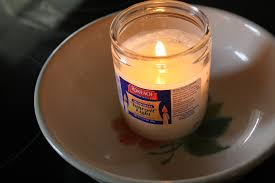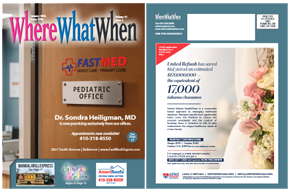
In a mother’s womb, twins had a conversation.
One asked the other, “Do you believe in life after delivery?”
The other replied, “Why, of course. There has to be something after delivery. Maybe we are here to prepare ourselves for what we will be later.”
“Nonsense” said the first. “There is no life after delivery. What kind of life would that be?”
The second said, “I don’t know, but it will be lighter than here. Maybe we will walk with our legs and eat from our mouths. Maybe we will have other senses that we can’t understand now.”
The first replied, “That is absurd. Walking is impossible. And eating with our mouths? Ridiculous! The umbilical cord supplies nutrition and everything we need. But the umbilical cord is so short. Life after delivery is to be logically excluded.”
The second insisted, “Well I think there is something, and maybe it’s different than it is here. Maybe we won’t need this physical cord anymore.”
The first replied, “Nonsense. If there is life, then why has no one ever come back from there? Delivery is the end of life, and in the after-delivery there is nothing but darkness and silence and oblivion. It takes us nowhere.”
“Well, I don’t know,” said the second, “but certainly we will meet Mother and she will take care of us.”
The first replied “Mother? You actually believe in Mother? That’s laughable. If Mother exists, then where is she now?”
The second said, “She is all around us. We are surrounded by her. We are of her. It is in her that we live. Without her this world would not and could not exist.”
Said the first, “Well I don’t see her, so it is only logical that she doesn’t exist.”
To which the second replied, “Sometimes, when you’re in silence and you focus and you really listen, you can perceive Her presence, and you can hear her loving voice, speaking to you.”
* * *
This is an old parable, and it depicts our situation so beautifully. We are believers; we believe in the World to Come, but we cannot fathom what it will be like. Nobody has ever come back to tell us, so we only have our mesorah (traditions) to help us envision what happens there.
My mother passed away two years ago, so I have been thinking about her yahrzeit, which is in the month of Adar. According to our Jewish traditions, mitzvos that are done in this world can give merit to our loved ones in the next world. I wonder if my mother is actually hoping and looking forward to the actions we will be doing in her merit. It is a wondrous but scary thought that we have the power to connect to our parents even if they are not in this world.
Remembering our Loved Ones
But how can people whose feet are firmly grounded in this world connect to our loved ones who are in the next world?
Our Torah traditions have much to say on this topic. I found a book in Shabsi’s Judaica called The Neshama Should Have an Aliyah, by Rabbi Zvi Hebel (published by Judaica Press 2009) that explains the sources and ideas behind those traditions. Here are some ideas from that sefer.
The basis of doing good deeds and learning L’iluy neshama (to uplift a soul) is taken from the Gemara, which says, b’ra mezakeh abba, a son can help his father to attain merit. “Since it is the parents who are the cause of the child’s existence in this world, they may be said to live on through their progeny. Thus, if the child performs righteous deeds, it means that the parents, too, are performing these deeds through their child.” (Sanhedrin/ArtScroll, pg. 104a)
This is true even if the parent was not the one who caused his child to do good deeds. We learn this from the story of Terach, Avraham’s father, who was an idol worshipper, He put many obstacles to serving G-d in his son’s path. According to some, he did not even repent before his passing. Nevertheless, the Ramban tells us, he was able to enter the World to Come in the merit of his righteous son.” (Ramban, Bereishis 11:32)
The Chofetz Chaim stated, “Through any mitzvos and meritorious acts that one’s offspring fulfills after his passing, the father’s soul receives atonement.” Indeed, according to the Shelah (as quoted by Chofetz Chaim-Ahavas Chesed part 2, Chapter 15), a person can give merit to a person who has died even if they are not his parents by having the deceased in mind or specifically mentioning the name before fulfilling the mitzva.”
Of course, when we talk about doing mitzvos to create merits in the next world, it may be different than we can imagine. Despite the fact that there is so much we do not know about the next world, we still long to connect to the people we loved, and our mesorah gives us an opportunity to help them. It is a real chesed shel emes, a true chesed, because there can be no ulterior motive or hope of reciprocation. The only motive is to benefit the person whom you loved.
A Yahrzeit: Happy or Sad?
So is the day of a yahrzeit a happy or a sad day? On the one hand, it is the day on which our loved one left us; on the other hand, we make kiddushim and siyumim and elaborate meals to remember.
In Rabbi Hebel’s book, the author explains that a yahrzeit is similar to Rosh Hashanah. According to Rav Nachman of Breslov, it is the “Rosh Hashanah for the neshama, in that the outcome of the remainder of the year is determined by and follows from the proceedings of this day.” (page 147) And like Rosh Hashanah, the Day of Judgment, although we might feel fear, we nevertheless eat holiday meals and dress in our best clothing, because we are confident that the judgment will be a favorable one. Similarly, we are confident that our learning and good deeds will help the neshama to have an aliyah.
Making a Siyum
Of course, one of the strongest values we have is the value of learning and many families try to make a siyum on the yahrzeit or do some other learning in memory of their loved ones. I have heard of devoted children who continue to make a siyum in honor of their parents every year for more than 50 years. Their allegiance to their parents does not wane over time.
In Baltimore, a rebbi has been writing chiddushei Torah on both his father and his mother’s yahrzeits and distributing them to friends and family.
Many of us have attended the memorial lectures for M. Leo Storch, which have been going on for almost 50 years.
There are learning programs for boys and men that are supported in memory of members of the community – for example, the Shearith Israel has the R’ Meir Steinharter Kol Hane’arim Saturday night learning program.
Sometimes people coordinate a group learning effort in order to finish Mishnayos or Shas. It takes cooperation and effort to organize all the family members to learn the entire Mishna. Our family, headed by a grandson, Zevy Bhatia, worked hard to finish mishnayos in honor of my mother’s first yahrzeit. Here is a sample of one particularly personal and humorous email written a few months ago encouraging people to sign up for all the masechtos.
Baruch HaShem we have approximately filled up one third of the mishnayos chart for Oma. There are, however, almost 40 masechtos that are longing for someone to claim them. Many of those who are reading this email have shared Oma’s beet and potato salads around a Shabbos meal. While Oma cannot make those salads anymore, you can send Oma the celestial counterpart of a complete Shabbos meal, replete with cholent, soup, and roast beef by learning Maseches Shabbos. Others are likely warmed by their memories of Oma and Opa’s beautiful shalom bayis, which inspired so many to strengthen their own marriages, thus preventing many gittin. That masechta is open too….
Memorials
Many large and small organizations have been established in the memory of loved ones. Usually people try to find an idea that they feel would be apropos for the person they are remembering. Some projects turn out to be very big, like Yad Batya l’Kallah that helps kallahs and Zichron Shlome Refuah Fund that helps people with cancer.
Then there are smaller projects. Here is a sample of some in Baltimore:
Chani is the proprietor of the Chassan and Kallah Suite. Chani explains, “The Chassan and Kallah Suite was created in memory of my grandparents. They had such a special relationship that they were like a chassan and kallah for 63 years, so we thought that a place for chassanim and kallahs to stay during sheva brachos would be a perfect memorial for them. People stay for a couple of days or up to a month. We have a small kitchenette, a bathroom, a bedroom, and, best of all, a private entrance. We don’t charge any money, and we seem to have tapped into a real need, because we are very busy; our suite is in use almost all the time. If anybody else has a suitable space in their home I would suggest that they try this chesed as well.”
Another project is the Speech Language Pathology Gemach established by Lea Berger in memory of Debra Freidman. Lea Berger and Debra Friedman were speech therapists and coworkers. After Debra passed away this year, Mr. Friedman gave Lea all the supplies, games, and materials from Debra’s speech therapy practice. Lea decided that the best way to honor Debra was to use her materials to help beginning speech therapists who might not have the money to buy the supplies they needed. She chooses to honor the memory of Mrs. Friedman with the materials that had so much meaning to her.
Aryeh Leib Freedman established Missaskim of Maryland in memory of Rabbi Mendel Freedman, the principal of BY elementary school for many years. They provide families who are sitting shiva with everything they need, including Sifrei Torah, siddurim, shtenders, chairs for aveilim, etc.
Shulamis Juravel decided to sew tablecloths for the tables in the women’s section of the Agudah in memory of her father. It took a lot of time and money to buy the fabric and sew the tablecloths, but it was a labor of love and something that she thought would be meaningful to her father.
Another project, which I especially love, is Mei Miriam, which provides cold water bottles throughout the neighborhood for people to drink on hot summer days. This was done in memory of Mrs. Miriam Lowenbraun. I always think of her when I take a bottle.
And there are ideas that are even smaller than that. I recently drank from a water fountain in Bais Yaakov and noticed a sign reminding me to make a bracha and displaying the bracha and its translation. At the bottom was the name of the person it was in memory of.
There are many more projects. Many of them are under the auspices of The Chesed Fund and are listed on the hard card in the Eruv List.
There is much more to say about the subject of yahrzeits and ways to connect and give to people whom we loved and are no longer in this world. If you are interested in this subject, I recommend the book I mentioned earlier in the article. I learned a lot from my research and feel more prepared to honor my mother on her yartzheit






